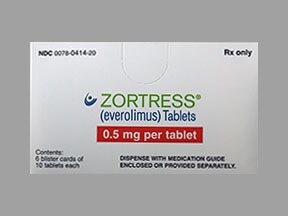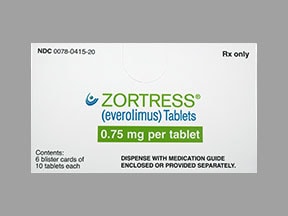What is Zortress?
Zortress is a prescription medicine used to prevent transplant rejection (antirejection medicine) in people who have received a kidney transplant or liver transplant. Transplant rejection happens when the body’s immune system perceives the new transplanted kidney as “foreign” and attacks it.
Zortress is used with other medicines called cyclosporine, corticosteroids and certain other transplant medicines to prevent rejection of your transplanted kidney. Zortress is used with other medicines called tacrolimus and corticosteroids to prevent rejection of your transplanted liver.
It is not known if Zortress is safe and effective in transplanted organs other than the kidney and liver.
It is not known if Zortress is safe and effective in children under 18 years of age.
What is the most important information I should know about Zortress?
Zortress can cause serious side effects, including:
- Increased risk of getting certain cancers. People who take Zortress have a higher chance of getting lymphoma and other cancers, especially skin cancer. Talk to your doctor about your risk for cancer.
- Increased risk of serious infections. Zortress weakens the body’s immune system and affects your ability to fight infections. Serious infections can happen with Zortress that may lead to death. People taking Zortress have a higher chance of getting infections caused by viruses, bacteria, and fungi (yeast).
- Call your doctor if you have symptoms of infection including fever or chills.
- Blood clot in the blood vessels of your transplanted kidney. If this happens, it usually occurs within the first 30 days after your kidney transplant. Tell your doctor right away if you:
- have pain in your groin, lower back, side or stomach (abdomen)
- make less urine or you do not pass any urine
- have blood in your urine or dark colored urine (tea-colored)
- have fever, nausea, or vomiting
- Serious problems with your transplanted kidney (nephrotoxicity). You will need to start with a lower dose of cyclosporine when you take it with Zortress. Your doctor should do regular blood tests to check your levels of both Zortress and cyclosporine.
- Increased risk of death that can be related to infection, in people who have had a heart transplant.
You should not take Zortress without talking to your doctor if you have had a heart transplant.
See the section “What are the possible side effects of Zortress?” for information about other serious side effects.
Who should not take Zortress?
Do not take Zortress if you are allergic to:
- everolimus (Zortress/Afinitor) or any of the ingredients in Zortress. See the end of this Medication Guide for a complete list of ingredients in Zortress.
- sirolimus (Rapamune)
What should I tell my healthcare provider before taking Zortress?
Before taking Zortress, tell your doctor about all of your medical conditions, including if you:
- have liver problems
- have skin cancer or it runs in your family
- have high cholesterol or triglycerides (fat in your blood)
- have Lapp lactase deficiency or glucose-galactose malabsorption. You should not take Zortress if you have this disorder.
- are pregnant or could become pregnant. Zortress may harm your unborn baby. If you are able to become pregnant you should use effective birth control during treatment and for 8 weeks after your last dose of Zortress. Talk to your doctor about birth control methods that may be right for you during this time. If you become pregnant or think you are pregnant, tell your healthcare provider right away. You should not become pregnant during treatment with Zortress.
- are breastfeeding or plan to breastfeed. It is not known if Zortress passes into your breast milk.
Tell your doctor about all the medicines you take, including prescription and over-the-counter medicines, vitamins, and herbal supplements.
Especially tell your doctor if you take:
- antifungal medicine
- antibiotic medicine
- heart medicine
- high blood pressure medicine
- a medicine to lower cholesterol or triglycerides
- cyclosporine (Sandimmune, Gengraf, Neoral)
- tuberculosis (TB) medicine
- HIV medicine
- St. John’s Wort
- seizure (anticonvulsant) medicine
How should I take Zortress?
- Take Zortress exactly as your doctor tells you to.
- Do not stop taking Zortress or change your dose unless your doctor tells you to.
- Take Zortress at the same time as your dose of cyclosporine medicine.
- Do not stop taking or change your dose of cyclosporine or tacrolimus medicine unless your doctor tells you to.
- If your doctor changes your dose of cyclosporine, your dose of Zortress may change.
- Take Zortress 2 times a day about 12 hours apart.
- Swallow Zortress tablets whole with a glass of water. Do not crush or chew Zortress tablets.
- Take Zortress tablets with or without food. If you take Zortress tablets with food, always take Zortress tablets with food. If you take Zortress tablets without food, always take Zortress tablets without food.
- Your doctor will do regular blood tests to check your kidney function while you take Zortress. It is important that you get these tests done when your doctor tells you to. Blood tests will monitor how your kidneys are working and make sure you are getting the right dose of Zortress and other transplant medications they may be on (cyclosporine and tacrolimus).
- If you take too much Zortress, call your doctor or go to the nearest hospital emergency room right away.
What should I avoid while taking Zortress?
- Avoid receiving any live vaccines while taking Zortress. Some vaccines may not work as well while you are taking Zortress.
- Do not eat grapefruit or drink grapefruit juice while you are taking Zortress. Grapefruit may increase your blood level of Zortress.
- Limit the amount of time you spend in the sunlight. Avoid using tanning beds or sunlamps. People who take Zortress have a higher risk of getting skin cancer. See the section “What is the most important information I should know about Zortress?” Wear protective clothing when you are in the sun and use a sunscreen with a high protection factor (SPF 30 and above). This is especially important if you have fair skin or if you have a family history of skin cancer.
- Avoid becoming pregnant. See the section “What should I tell my doctor before taking Zortress?”
What are the possible side effects of Zortress?
Zortress may cause serious side effects, including:
- See “What is the most important information I should know about Zortress?”
- swelling under your skin especially around your mouth, eyes and in your throat (angioedema). Your chance of having swelling under your skin is higher if you take Zortress along with certain other medicines. Tell your doctor right away or go to the nearest emergency room if you have any of these symptoms of angioedema:
- sudden swelling of your face, mouth, throat, tongue or hands
- hives or welts
- itchy or painful swollen skin
- trouble breathing
- delayed wound healing. Zortress can cause your incision to heal slowly or not heal well. Call your doctor right away if you have any of the following symptoms:
- your incision is red, warm or painful
- blood, fluid, or pus in your incision
- your incision opens up
- swelling of your incision
- lung or breathing problems. Tell your doctor right away if you have new or worsening cough, shortness of breath, difficulty breathing or wheezing. In some patients lung or breathing problems have been severe, and can even lead to death. Your doctor may need to stop Zortress or lower your dose.
- increased cholesterol and triglycerides (fat in your blood). If your cholesterol and triglyceride levels are high your doctor may want to lower them with diet, exercise and certain medicines.
- protein in your urine (proteinuria).
- change in kidney function. Zortress may cause kidney problems when taken along with a standard dose of cyclosporine medicine instead of a lower dose.
Your doctor should do blood and urine tests to monitor your cholesterol, triglycerides and kidney function.
- viral infections. Certain viruses can live in your body and cause active infections when your immune system is weak. Viral infections that can happen with Zortress include BK virus-associated nephropathy. BK virus can affect how your kidney works and cause your transplanted kidney to fail.
- blood clotting problems.
- diabetes. Tell your doctor if you have frequent urination, increased thirst or hunger.
- infertility, male. Zortress can affect fertility in males and may affect your ability to father a child. Talk with your doctor if this is a concern for you.
- infertility, female. Zortress can affect fertility in females and may affect your ability to become pregnant. Talk to your doctor if this is a concern for you.
- sudden swelling of your face, mouth, throat, tongue or hands
The most common side effects of Zortress in people who have had a kidney or liver transplant include:
These common side effects have been reported in both kidney and liver transplant patients:
- nausea
- swelling of the lower legs, ankles and feet
- high blood pressure
The most common side effects of Zortress in people who have had a kidney transplant include:
- constipation
- low red blood cell count (anemia)
- urinary tract infection
- increased fat in the blood (cholesterol and triglycerides)
The most common side effects of Zortress in people who have had a liver transplant include:
- diarrhea
- headache
- fever
- abdominal pain
- low white blood cells
These are not all of the possible side effects of Zortress.
Call your doctor for medical advice about side effects. You may report side effects to FDA at 1-800-FDA-1088.
Zortress Images
General information about the safe and effective use of Zortress
Medicines are sometimes prescribed for purposes other than those listed in a Medication Guide. Do not use Zortress for a condition for which it was not prescribed. Do not give Zortress to other people, even if they have the same symptoms that you have. It may harm them. You can ask your doctor or pharmacist for information about Zortress that is written for healthcare professionals.
How should I store Zortress?
- Store Zortress tablets between 59°F to 86°F (15°C to 30°C).
- Keep Zortress out of the light.
- Keep Zortress tablets dry.
Keep Zortress and all medicines out of the reach of children.
What are the ingredients in Zortress?
Active ingredient: everolimus
Inactive ingredients: butylated hydroxytoluene, magnesium stearate, lactose monohydrate, hypromellose, crospovidone and lactose anhydrous.
For more information, call 1-888-669-6682 or visit www.zortress.com.






